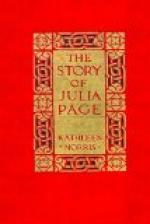“That’s what I was thinking,” said Barbara.
The Studdifords went to San Mateo after the wedding, and Julia, who had taken herself seriously in hand, entered upon the social life of the summer with a perfectly simulated zest. She rode and drove, played golf and tennis and polo, gossiped and spent hours at bridge, she went tirelessly from luncheon to tea, from dinner to supper party, and when Jim was detained in town, she went without him; a little piece of self-reliance that pleased him very much. If society was not extremely popular with Julia, Julia was very popular with society; her demure beauty made her conspicuous wherever she went, and in July, prominent in some theatricals at the clubhouse, she earned all honours before her.
Julia found the theatricals perilously delightful; the grease paint and the ornate costume seemed like old friends; she was intoxicated and enchanted by the applause. For several days after her most successful performance she was thoughtful: what if she had never joined the “Amazon” caste, never gone to Sausalito, followed naturally in the footsteps of Connie Girard and Rose Ransome? She might have been a great actress; she would have been a great beauty.
San Mateo, frankly, bored her, although she could not but admire the beautiful old place, the lovely homes set in enchanting old gardens, the lawns and drives stretching under an endless vista of superb oaks. There, alone with Jim, in a little cottage—ah, there would have been nothing boring about that!
But the Hardesty cottage never seemed like home to her, they had rented the big, shingled brown house for only three months, and Jim was anxious that she should not tire herself with altering the arrangement of furniture and curtains for so casual a tenancy. The Hardesty’s pictures looked down from the wall, their chairs were unfriendly, their books under lock and key. Not a lamp, not a cup or saucer was familiar to Julia; she felt uncomfortable in giving dinner parties with “H” on the silver knives and forks; she never liked the look of the Hardesty linen. Life seemed unreal in the “Cottage”; she seemed to be pushed further and further away from reassuring contact with the homely realities of love and companionship; chattering people were always about her, pianoplayers were rippling out the waltz from “The Merry Widow,” ice was clinking in cocktail shakers, the air was scented with cigarettes, with the powder and perfumery of women. She and Jim dined alone not oftener than once a week, and their dinner was never finished before friendly feet crisped on the gravel curve of the drive, and friendly invaders appeared to invite them to do something amusing: to play cards, to take long spins in motor cars, or to spend an idle hour or two at the club. Sometimes they were separated, and Julia would come in, chilled and tired after a long drive, to find Jim ahead of her, already sound asleep. Sometimes she left him smoking with some casual guest, and fell asleep long before the voices downstairs subsided. Even if they went upstairs together, both were tired; there was neither time nor inclination for confidences, for long and leisurely talk.




